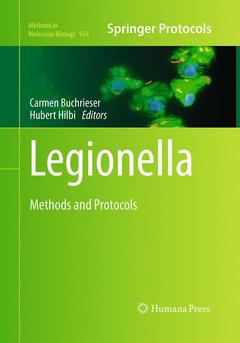Description
Legionella, Softcover reprint of the original 1st ed. 2013
Methods and Protocols
Methods in Molecular Biology Series, Vol. 954
Coordinators: Buchrieser Carmen, Hilbi Hubert
Language: English
Subject for Legionella:
Support: Print on demand
622 p. · 17.8x25.4 cm
Description
/li>Contents
/li>Comment
/li>
Legionnaires? disease is a severe form of pneumonia that can occur in epidemics of several hundred cases. This atypical pneumonia is characterized by a high mortality rate and affects primarily elderly and immuno-compromised individuals. An in-depth understanding of the ecology and virulence of Legionella spp. will contribute to an efficient and sustainable elimination of the bacteria from anthropogenic water systems and might lead to the development of novel therapeutics. The many different methods described in Legionella: Methods and Protocols are all specifically adapted and developed for the study of distinct features of L. pneumophila, and have already led to exciting discoveries. Most of these techniques can also be applied to the study of other bacterial pathogens, in particular intracellular pathogens like Shigella, Salmonella or Listeria. . Written in the successful Methods in Molecular Biology? series format, chapters include introductions to their respective topics, lists of the necessary materials and reagents, step-by-step, readily reproducible protocols, and notes on troubleshooting and avoiding known pitfalls.
Authoritative and easily accessible, Legionella: Methods and Protocols will not only be useful for research groups studying Legionella, but also for a broader scientific community studying the epidemiology, typing, physiology, pathogenesis, immunity, genetics and evolution of other bacterial pathogens.
Identification of Legionella in the Environment.- Identification of Legionella in Clinical Samples.- Sequence-Based Identification of Legionella.- Investigation of Outbreaks - Epidemiology.- Outbreak Investigations and Identification of Legionella in Contaminated Water.- Typing Methods for Legionella.- Culture, Media and Handling of Legionella.- The Intracellular Metabolism of Legionella by Isotopologue Profiling.- Induction of Competence for Natural Transformation in Legionella pneumophila and Exploitation for Mutant Construction.- Constructing Unmarked Gene Deletions in Legionella pneumophila.- Natural Biofilm Formation with Legionella pneumophila.- Production of Legionella pneumophila Monospecies Biofilms in a Low-Nutrient Concentration Medium.- Enrichment of Outer Membrane Vesicles Shed by Legionella pneumophila.- Analysis of Legionella Infection by Flow Cytometry.- Analysis of Legionella Infection Using RNAi in Drosophila Cells.- Immunofluorescence Imaging of Legionella Infection In vitro.- Electron Microscopy of Legionella and Legionella-Infected Cells.- Pathogen Vacuole Purification from Legionella-Infected Amoeba and Macrophages.- Methods for Determining Protein Translocation by the Legionella pneumophila Dot/Icm Type IV Secretion System.- Subcellular Localization of Legionella Dot/Icm Effectors.- Purification and Characterization of Legionella U-Box-Type E3 ubiquitin ligase.- Legionella Phospholipases Implicated in Infection – Determination of Enzymatic Activities.- Interactions of Legionella Effector Proteins with Host Phosphoinositide Lipids.- Characterization of Legionella lipopolysaccharide.- The Tetrahymena and Acanthamoeba Model Systems.- Dictyostelium Host Response to Legionella infection: Strategies and Assays.- The Caenorhabditis elegans Model of Legionella Infection.- Infection of Nonphagocytic Host Cells by Legionella.- Analyzing Caspase-1 Activation During Legionella pneumophila Infection in Macrophages.- The Mouse as a Model for Pulmonary Legionella Infection.- Assessment of Legionella-Specific Immunity in Mice.- The Guinea Pig Model of Legionnaires’ Disease.- Human Susceptibility to Legionnaires´ Disease.- cDNA library Construction for Next Generation Sequencing (NGS) to Determine the Transcriptional Landscape of Legionella pneumophila.- Methods to Study Legionella Transcriptome in vitro and in vivo.- Co-Immunoprecipitation: Protein-RNA and Protein-DNA Interaction.- Identification of Legionella Effectors UsingBioinformatic Approaches.

